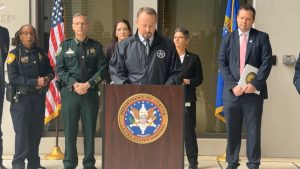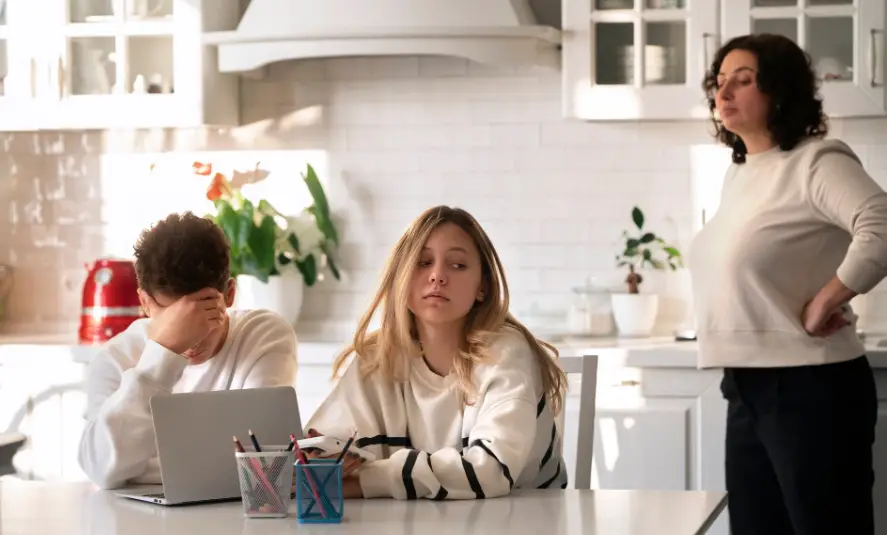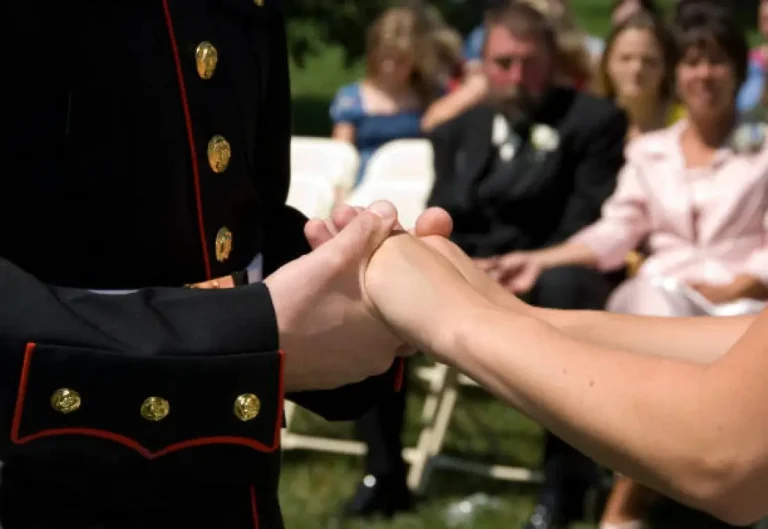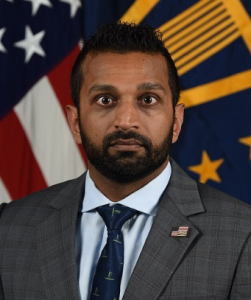The Words I Wish I Could Take Back: How One Moment of Grief Nearly Shattered a Dying Man’s Last Promise
Standing at my kitchen table at 2 AM, clutching my son’s final letter in trembling hands, I realized I had become the very person he had feared I might become – and there might be no way back
When Love Becomes Loss
The silence that followed my words was deafening. “You must leave. My house is not a free shelter.” I watched as Lynn, my daughter-in-law of eight years, gathered her two young children closer to her side, her face draining of color but maintaining a composure that I would later understand was born of profound grace, not indifference.
In that moment, standing in the living room where my son Marcus had proposed to her seven years earlier, I had done the unthinkable. I had broken the most sacred promise a dying man can make – the promise to protect those he loves most after he’s gone.
What happened next would teach me that grief doesn’t just steal our loved ones; it can steal our humanity too. But sometimes, if we’re lucky, love gives us a second chance to choose who we really are when everything else falls away.
The House That Love Built
For six years, Lynn and her children – Emma, now 8, and little Jake, just 5 – had called my three-bedroom colonial home their sanctuary. What began as a temporary arrangement when Marcus lost his job during the pandemic had evolved into something beautiful: a multi-generational household where laughter echoed through hallways, where Sunday dinners brought three generations together, and where my grandchildren knew the comfort of having both parents and grandparents under one roof.
Marcus had been my only child, born when I was just 22 and struggling to find my way in the world. His mother, my late wife Sarah, had passed when he was only 12, leaving us to navigate the turbulent teenage years together. Through baseball games and broken hearts, college applications and wedding planning, Marcus and I had developed the kind of father-son relationship that other men envied.
When he brought Lynn home for the first time, I knew immediately she was special. There was something in the way she laughed at his terrible jokes, the way she remembered details about my work and asked thoughtful follow-up questions, the way she seamlessly integrated herself into our small family without ever trying to replace the mother Marcus had lost too young.
“Dad, I think she’s the one,” Marcus had confided in me after that first dinner. “She makes everything feel like home.”
The house had been purchased with exactly that vision in mind. After Sarah’s death, I had downsized from our family home to a smaller place, but when Marcus announced his engagement, I upgraded again – choosing a house with enough space for the family I hoped we would become. The extra bedrooms were never seen as financial burdens but as investments in our shared future.
When Everything Changed Forever
The diagnosis came on a Tuesday in March: stage four pancreatic cancer, aggressive and advanced beyond treatment options. Marcus, just 35 years old, was given six months to live. In the end, he fought for eight – eight months of treatments that left him weak but determined, of bucket list adventures compressed into weeks instead of years, of conversations no parent should ever have to have with their child.
During those final months, Marcus worried constantly about Lynn and the children. Not about their financial security – his life insurance and savings would provide for them – but about their emotional well-being. He knew that grief could change people, that loss could turn love into resentment, that his death might fracture the family bonds that had sustained all of us through previous difficulties.
“Promise me, Dad,” he said during one of our late-night conversations in his final weeks, his voice weak but insistent, “promise me that Lynn and the kids will always have a home with you. Not because they need charity, but because we’re family. Promise me you won’t let my death break what we’ve built together.”
I had made that promise with tears in my eyes and absolute certainty in my heart. At the time, I couldn’t imagine any scenario where I would want Lynn and the children anywhere but close to me, where their presence would be anything but a comfort during the darkest period of my life.
I was wrong about so many things.
When Grief Becomes a Weapon
The funeral was beautiful – a celebration of Marcus’s life that brought together hundreds of people whose lives he had touched during his brief time on earth. Lynn spoke with grace and strength that amazed everyone present, sharing stories of their love and his devotion to family that left not a dry eye in the room.
For the first few weeks after the service, we supported each other exactly as Marcus had hoped we would. We shared meals and memories, tears and occasionally laughter. Emma and Jake’s presence provided moments of joy that pierced through the darkness of loss. Lynn’s quiet strength anchored all of us when the waves of grief threatened to overwhelm.
But as weeks turned to months, something insidious began to grow in the spaces that Marcus’s laughter used to fill. The house, once alive with the energy of a young family, felt heavy with absence. Every corner held memories that now caused pain instead of pleasure. The guest room where Lynn and the children slept became a constant reminder that they were there because Marcus was not.
My grief, initially pure and clean in its devastation, began to ferment into something uglier. Resentment crept in – not rational resentment, but the kind that grief manufactures when it needs somewhere to direct its anger. Why should Lynn get to move on with her life while I remained trapped in this house full of ghosts? Why should her children get to laugh and play while my child lay silent in the ground?
The breaking point came on a Sunday evening in October, exactly six months after Marcus’s death. Lynn was helping the children with homework at the kitchen table – the same table where Marcus had done his own homework thirty years earlier. Emma was struggling with a math problem, and Lynn was patiently explaining it for the third time, her voice gentle and encouraging.
Suddenly, I couldn’t bear it. The normalcy of the scene, the way life had continued to move forward despite the crater that Marcus’s death had left in our family, felt like a betrayal. Before I could stop myself, the words erupted from a place of pain I didn’t even know existed.
“You must leave. My house is not a free shelter.”
The silence that followed was complete. Even Jake, normally a chatterbox, went quiet. Lynn’s face went pale, but she didn’t argue, didn’t defend herself, didn’t point out the cruelty and injustice of what I had just demanded. She simply nodded, gathered her children, and said quietly, “We’ll start looking for a place tomorrow.”
The Letter That Changed Everything
That night, unable to sleep, I wandered through the house that suddenly felt even emptier than it had before. In Marcus’s old room, which had become a sort of shrine since his death, I found myself opening the drawer where Lynn had carefully preserved his personal effects.
Among his belongings was a letter I had never seen before – a sealed envelope with my name written in Marcus’s careful handwriting. My hands shook as I opened it, recognizing immediately that this was meant to be read after his death, a final communication from my son to me.
Dad,
If you’re reading this, it means I’m gone and you’re struggling more than you want to admit. I know you, and I know that grief might try to turn you into someone you’re not. You might start to see Lynn and the kids as reminders of what you’ve lost instead of connections to what we shared.
I need you to know something: Lynn didn’t choose this life. She didn’t choose to be a widow at 32, to raise two children alone, to rebuild her entire future around a reality that doesn’t include me. But she’s doing it with more grace and strength than I ever could have managed.
The kids need stability, Dad. They need to know that losing their father doesn’t mean losing their family. They need their grandfather – not as a landlord, but as the man who taught me what it means to be a good father.
Lynn needs that too, though she’d never ask for it. She needs to know that loving me meant something, that the family we built together doesn’t end just because I’m not there to maintain it.
I’m asking you – no, I’m begging you – don’t let your grief push away the people I love most. They’re not a burden on your healing; they’re the path to it. In loving them, you’re loving me. In protecting them, you’re honoring everything we built together.
Promise me, Dad. Promise me you’ll choose love over loneliness, family over solitude. Promise me you’ll remember that home isn’t a building – it’s the people who fill it with love.
All my love, Marcus
I read the letter three times before the full weight of what I had done settled on my chest like a physical pressure. Marcus had known – somehow, he had understood exactly how grief might twist my love into cruelty, my protective instincts into rejection. And he had trusted me to be better than my worst impulses.
Instead, I had become exactly what he feared I might become.
The Conversation That Rebuilt a Family
The next morning, I found Lynn in the kitchen, quietly packing the children’s lunch boxes as if this were any other day. Emma and Jake were eating cereal, subdued but not yet understanding the full implications of what had happened the night before.
“Lynn,” I said, my voice hoarse from a night of tears, “we need to talk.”
She looked up, her eyes red-rimmed but determined. “It’s okay, Mr. Patterson. I understand. This has been hard on all of us.”
“No,” I said firmly, “it’s not okay. What I said last night – it was wrong. It was cruel. And it betrayed every promise I made to Marcus.”
I sat down across from her at the table where we had shared thousands of meals, where Marcus had announced his engagement, where Emma had learned to read, where Jake had blown out birthday candles. I pulled his letter from my pocket and placed it between us.
“I found this last night,” I said. “Marcus knew – he knew that grief might try to turn me into someone I’m not. He trusted me to be better than that, and I failed him. But more importantly, I failed you and the children.”
Lynn’s composure finally cracked, and tears began to flow. “He was always thinking of others,” she whispered. “Even at the end, he was trying to take care of everyone else.”
“He loved you so much,” I continued, my own voice breaking. “And he trusted me to show that love by taking care of his family. Instead, I let my pain speak louder than my heart.”
I reached across the table and took her hands in mine. “This house is your home – not because you need charity, but because you are family. Because Marcus chose you, and in choosing you, he chose us. I want you and the children here not out of obligation, but because keeping you close keeps him close too.”
The Healing Power of Chosen Family
The transformation didn’t happen overnight, but it began in that moment of honest acknowledgment and mutual forgiveness. Over the following weeks, we began to rebuild not just our living arrangement, but our understanding of what family means when death has altered its structure.
Lynn and I started taking evening walks, sharing memories of Marcus and gradually building new memories together. We established routines that honored his presence while acknowledging his absence – Sunday dinners where we’d share one favorite Marcus story, bedtime prayers where Emma and Jake could talk to Daddy even though he couldn’t answer back.
The children, resilient in the way that only children can be, quickly readjusted to the security of knowing their home was permanent. Jake’s nightmares, which had begun after I’d demanded they leave, gradually subsided. Emma’s grades, which had started slipping during the uncertainty, improved as stability returned to her world.
For me, the healing came through small daily acts of love and service. Making breakfast for my grandchildren, helping with homework, attending school plays and soccer games – these ordinary moments of family life became extraordinary opportunities to honor Marcus’s memory through caring for the people he loved most.
The Broader Lessons of Love and Loss
Our story reflects challenges faced by millions of families dealing with loss, blended families, and the complex emotions that arise when traditional family structures are disrupted by death. According to the National Alliance for Grieving Children, over 3.5 million children in the United States have experienced the death of a parent, and many of these children live in multi-generational households that provide crucial stability during their recovery.
Dr. Maria Santos, a family therapist specializing in grief counseling, explains that situations like ours are increasingly common. “When families are restructured by loss, everyone involved is grieving different aspects of what they’ve lost,” she notes. “The surviving parent grieves their spouse and their children’s innocence. The grandparents grieve their child and their previous role in the family. The children grieve their parent and their sense of security. These different grief processes can create conflict even among people who love each other deeply.”
The key to navigating these challenges, according to Dr. Santos, is communication, patience, and a willingness to extend grace during the healing process. “Grief makes us all temporarily irrational,” she explains. “The families that survive and thrive are those that can forgive each other’s worst moments and focus on their shared love for the person they’ve lost.”
Building New Traditions from Old Love
Two years later, our house has become truly home again – not the same home it was when Marcus was alive, but a different kind of home built on the foundation of his love and legacy. We’ve established new traditions that honor his memory while creating fresh opportunities for joy and connection.
Every year on Marcus’s birthday, we volunteer together at the children’s hospital where he received treatment, reading stories to young patients and their families. Emma and Jake have started a small garden in the backyard where they grow vegetables that Marcus loved, donating the harvest to local food banks in his memory.
Lynn has begun dating again – a development that initially triggered my protective instincts but ultimately brings me joy because it represents healing and hope. Any man who wants to be part of her life must understand that he’s joining a family that includes a loving grandfather and two children who will always miss their father but are learning that love can expand to include new people without diminishing what came before.
The Ongoing Journey of Grief and Growth
Living with grief as an extended family has taught us that healing isn’t a destination but a daily choice. Some days are harder than others. Some moments still catch us off guard with their intensity. But we’ve learned to support each other through the difficult times and to celebrate the good ones as gifts that Marcus would want us to enjoy.
The house that once felt like a museum of memories has become a living tribute to everything Marcus valued most: family connection, unconditional love, and the kind of daily kindness that makes ordinary moments sacred. His physical presence is gone, but his influence continues to shape how we treat each other and how we move through the world.
Conclusion: The True Meaning of Home
Marcus was right about so many things, but especially about this: home isn’t a building or an address. Home is the people who choose to love you, who show up for you during your worst moments, who forgive your failures and celebrate your successes. Home is the family you’re born into and the family you create through intention and commitment.
That night when I demanded that Lynn and the children leave, I was trying to evict my own pain by removing its reminders. What I learned instead is that healing comes not from pushing away the connections that make us vulnerable, but from embracing them as the very things that make life worth living.
Today, when Emma runs through the front door after school calling “Grandpa, I’m home!” and Jake climbs into my lap to show me his latest drawing, I understand what Marcus meant when he said that home is where love lives. My son may be gone, but the love he planted in this family continues to grow, connecting us to each other and to the man whose greatest legacy wasn’t his achievements or possessions, but the hearts he touched and the family he trusted us to remain.
In keeping them close, I keep him close too. And in that closeness, we all find our way home.

Emily Johnson is a critically acclaimed essayist and novelist known for her thought-provoking works centered on feminism, women’s rights, and modern relationships. Born and raised in Portland, Oregon, Emily grew up with a deep love of books, often spending her afternoons at her local library. She went on to study literature and gender studies at UCLA, where she became deeply involved in activism and began publishing essays in campus journals. Her debut essay collection, Voices Unbound, struck a chord with readers nationwide for its fearless exploration of gender dynamics, identity, and the challenges faced by women in contemporary society. Emily later transitioned into fiction, writing novels that balance compelling storytelling with social commentary. Her protagonists are often strong, multidimensional women navigating love, ambition, and the struggles of everyday life, making her a favorite among readers who crave authentic, relatable narratives. Critics praise her ability to merge personal intimacy with universal themes. Off the page, Emily is an advocate for women in publishing, leading workshops that encourage young female writers to embrace their voices. She lives in Seattle with her partner and two rescue cats, where she continues to write, teach, and inspire a new generation of storytellers.









